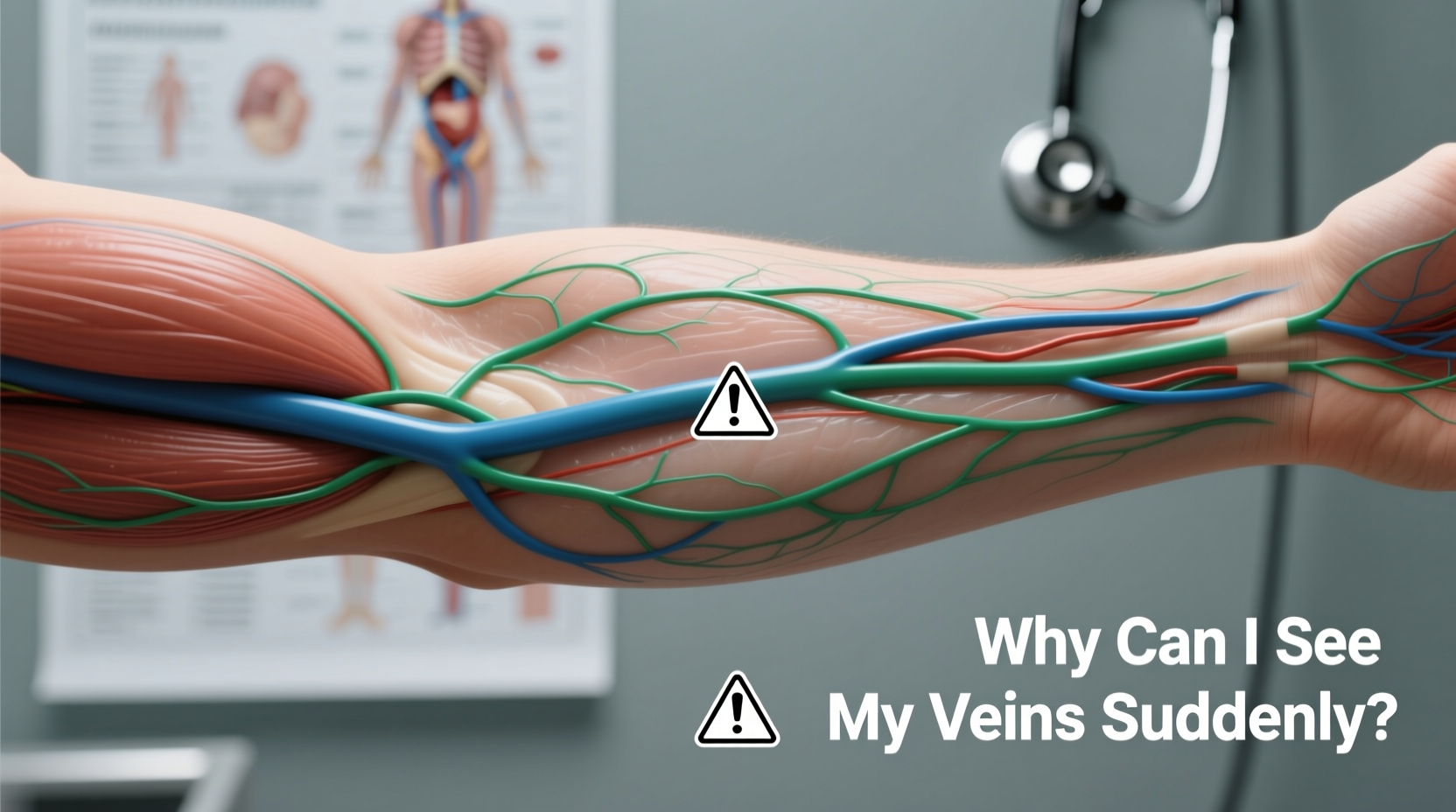Suddenly noticing your veins more prominently—especially on your hands, arms, or legs—can be surprising. You might wonder if it’s a sign of aging, dehydration, or something more serious. While visible veins are often harmless and even normal in certain situations, there are times when they signal an underlying health concern. Understanding the reasons behind this change helps you determine whether it's a temporary shift or a symptom worth discussing with a healthcare provider.
Common Causes of Suddenly Visible Veins

Veins become more noticeable due to changes in body composition, circulation, or environmental factors. Most of these causes are benign and reversible. Here are the most frequent explanations:
- Increased physical activity: Regular exercise, especially strength training, boosts blood flow and reduces body fat, making veins more visible.
- Low body fat percentage: As fat layers thin, veins lie closer to the skin surface and appear more pronounced.
- Dehydration: When dehydrated, blood volume drops slightly, causing veins to constrict and stand out more.
- Rising temperatures: Heat dilates blood vessels, increasing vein prominence, particularly in the arms and legs.
- Aging: Skin thins over time, and loss of collagen makes veins easier to see.
- Hormonal fluctuations: Pregnancy, menopause, or hormonal medications can affect vascular tone and fluid retention.
When Should You Be Concerned?
While most cases of prominent veins are harmless, some patterns suggest an underlying issue. Seek medical advice if you notice any of the following:
- Veins that are painful, warm, or red to the touch
- Sudden swelling in one limb
- Visible bulging or twisting veins (especially in the legs)
- Symptoms like cramping, heaviness, or restless legs
- One-sided vein prominence without a clear reason
“Not all visible veins are problematic, but asymmetric swelling or pain should never be ignored. It could indicate deep vein thrombosis or venous insufficiency.” — Dr. Lena Reyes, Vascular Medicine Specialist
Medical Conditions Linked to Sudden Vein Visibility
In some cases, visible veins are symptoms of diagnosed or developing conditions. These include:
Chronic Venous Insufficiency (CVI)
Occurs when vein valves weaken, allowing blood to pool in the legs. This leads to varicose veins, swelling, and discomfort. CVI affects nearly 40% of adults and is more common in those who stand for long periods.
Deep Vein Thrombosis (DVT)
A blood clot in a deep vein, usually in the leg. DVT can cause sudden swelling, redness, and pain. It’s a medical emergency because clots can travel to the lungs (pulmonary embolism).
Superficial Thrombophlebitis
Inflammation of a surface vein due to a clot. Often presents as a red, tender cord-like structure under the skin.
Portal Hypertension
Elevated blood pressure in the portal vein system, often due to liver disease. Can cause visible veins on the abdomen (caput medusae), which require urgent evaluation.
Genetic or Structural Factors
Some people naturally have more visible vasculature due to thinner skin, fair complexion, or inherited vein structure.
Do’s and Don’ts: Managing Vein Visibility
| Do’s | Don’ts |
|---|---|
| Stay hydrated to maintain healthy blood volume | Ignore persistent pain or swelling in limbs |
| Elevate legs if you experience lower extremity heaviness | Wear tight clothing that restricts circulation |
| Use sunscreen to preserve skin elasticity | Assume all bulging veins are cosmetic |
| Monitor changes over time and take photos for comparison | Self-treat suspected clots or inflamed veins |
| Consult a doctor if asymmetry or discomfort develops | Delay care if you have risk factors like immobility or clotting disorders |
Real-Life Example: A Case of Misinterpreted Vein Changes
Jamie, a 47-year-old office worker, noticed her left leg had become noticeably swollen over two weeks. She initially attributed the visible veins and tightness to standing more during family visits. However, after experiencing warmth and tenderness along the calf, she consulted her primary care physician. An ultrasound revealed deep vein thrombosis. Prompt anticoagulant treatment prevented complications. Her case underscores the importance of not dismissing unilateral changes—even if they seem minor at first.
Step-by-Step: What to Do If You Notice New Vein Prominence
- Assess symmetry: Compare both limbs. Is the visibility equal?
- Check for symptoms: Look for pain, swelling, warmth, or skin discoloration.
- Review recent changes: Consider new workouts, weight loss, or prolonged sitting/standing.
- Hydrate and rest: Rehydrate and elevate limbs if swelling is mild and bilateral.
- Monitor for 48–72 hours: If symptoms persist or worsen, contact a healthcare provider.
- Seek immediate care: If you have chest pain, shortness of breath, or severe limb swelling, go to the ER.
Frequently Asked Questions
Is it normal for veins to suddenly appear with weight loss?
Yes. As body fat decreases, especially under the skin, veins become more visible. This is especially common in the arms, hands, and abdomen and is typically not a cause for concern.
Can dehydration make veins more visible?
Absolutely. Dehydration reduces blood volume and causes veins to constrict, making them more prominent. Rehydrating often reduces their appearance within hours.
Are visible veins a sign of heart problems?
Not directly. While heart failure can lead to fluid retention and vascular changes, isolated vein visibility isn’t a reliable indicator. However, widespread swelling, shortness of breath, or fatigue alongside vein changes warrant cardiac evaluation.
Conclusion: Know Your Body, Trust Your Instincts
Seeing your veins more clearly isn’t inherently dangerous—it’s often a reflection of fitness, hydration, or natural aging. But your body communicates through subtle shifts, and sudden, asymmetric, or symptomatic vein changes deserve attention. By understanding the difference between normal variation and warning signs, you empower yourself to act wisely. Don’t hesitate to consult a healthcare professional if something feels off. After all, early detection can prevent small issues from becoming serious ones.









 浙公网安备
33010002000092号
浙公网安备
33010002000092号 浙B2-20120091-4
浙B2-20120091-4
Comments
No comments yet. Why don't you start the discussion?